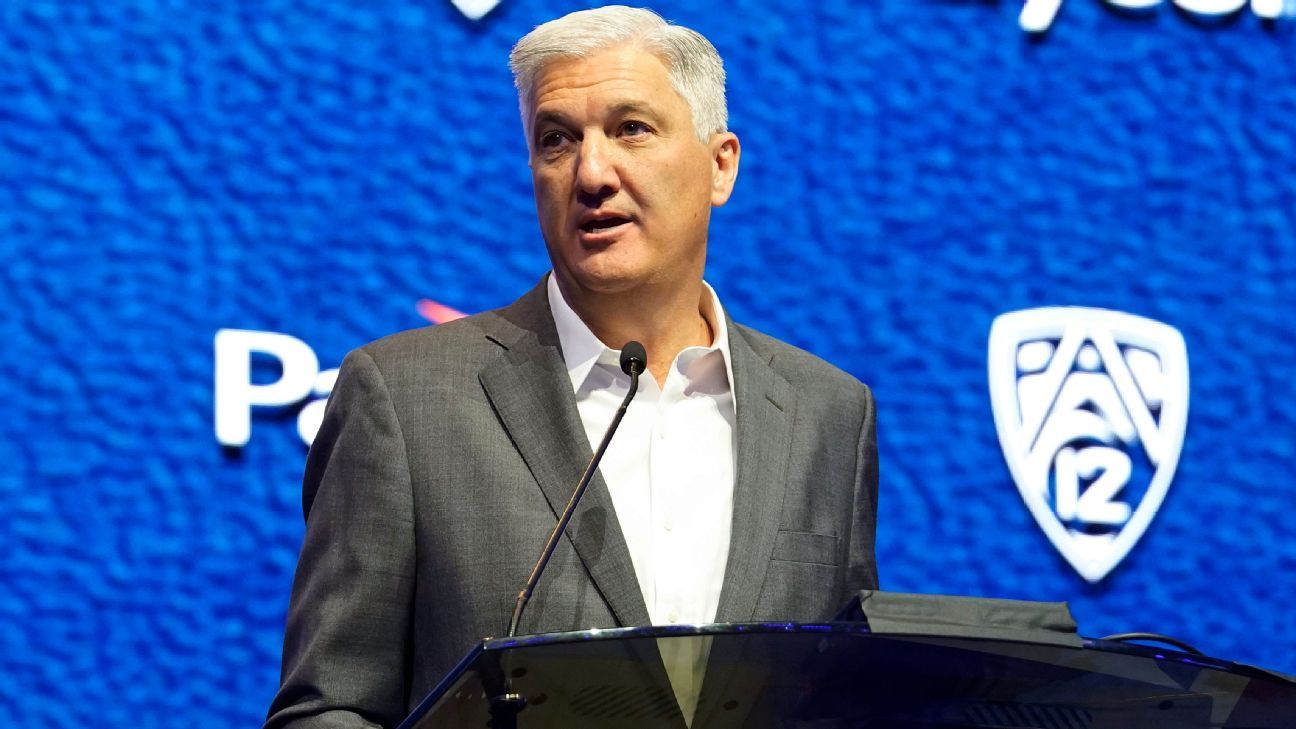LAS VEGAS — Pac-12 commissioner George Kliavkoff said Friday that he’s not concerned about the Big 12 trying to poach any teams, and that he hasn’t engaged in any public debate over the narrative of uncertainty around the league because he knows “the truth.”
“It’s not a concern,” he said at the Pac-12 media day, addressing the topic publicly for the first time this year. “Our schools are committed to each other and the Pac-12. We’ll get our media rights deal done, we’ll announce the deal. I think the realignment that’s going on in college athletics will come to an end for this cycle.”
While the Pac-12 has remained silent on the topic until now, Big 12 commissioner Brett Yormark has been outspoken about his desire to add more teams if it makes sense and creates value for his conference. Kliavkoff hinted that any notion of his league’s demise has come from the Big 12, saying he “kind of knows where the sources of that are coming from.”
“I discount that because I know the truth,” Kliavkoff said. “I could have spent all of last year getting into a he said-he said on every single rumor that’s been passed about our conference. We decided to take the high road and focus on the future of the conference. That’s why we haven’t engaged.”
Kliavkoff said his bigger concern about not publicly defending the league was the impact it might have on recruiting, but it’s “never been stronger.”
“That kind of reinforced our decision to not engage and stay with the high road,” he said.
Last week, a Pac-12 source told ESPN the league’s new media rights deal is likely to include a mix of streaming and linear options and is expected to be on-par with the ACC and Big 12. For the Pac-12 to stay intact after the departure of USC and UCLA to the Big Ten in 2024, the 10 remaining presidents and chancellors have to sign the grant of rights, which will depend on their satisfaction with the new deal. The 10 schools in the conference have pre-negotiated the grant of rights deal and agreed on the terms, including how the revenue would be split, which signifies a commitment to the conference — at least tangentially. The length of the grant of rights will mirror the terms of the television contract.
Kliavkoff said getting the right deal has always been more important to the board than “getting the expeditious one.” Kliavkoff said he has constantly updated the presidents and chancellors and believes “they’re enthusiastic” about the media deal.
“What we’ve seen is that the longer we wait for a deal, the better our options get,” Kliavkoff said. “I think our board realizes that. There’s an underlying shift in the media market that’s happening and we’re long-term taking advantage of that, but short-term may have provided some hiccups.”
The uncertainty in the Pac-12 has been magnified by the Big 12’s unabashed interest in the possibility of further conference expansion and its six-year, $2.2 billion television deal with ESPN and Fox that runs through 2031. The Big 12 opened its negotiations early and completed its agreement before the Pac-12, even though the Pac-12’s current television deal ends a year earlier.
Kliavkoff said that realignment in college football typically coincides the expiration of television deals, but he hasn’t ruled out adding more teams to his own conference.
“Let’s get our media rights deal done, get our grant of rights signed and then we’ll consider expansion,” he said.
The Pac-12 has never wavered from this timeline. According to sources, the Pac-12 board months ago narrowed its scope to a handful of schools. However, because the expanded, 12-team College Football Playoff will reward the six-highest ranked conference champions in 2024, some schools in the league believe there will be a benefit to being in a conference of 10 as opposed to 16.
Leaders throughout college athletics have been paying close attention to the Pac-12 and waiting for months to see how — if at all — the new deal could further impact conference realignment. The speculation has surrounded Arizona, Arizona State, Utah and Colorado, but Utah athletic director Mark Harlan reaffirmed his schools commitment Friday.
“We are a proud member of this conference and look forward to its future success,” he said.
The biggest flight risk, according to sources, has been Colorado, and it remains to be seen if the administration there has the patience to wait for the new deal before making a major decision that could have a tidal wave of effects.
“[Colorado’s] goal is to stay within the Pac-12 and have a media deal coming up shortly,” Colorado chancellor Phil DiStefano told the Denver Post this week. “That’s our goal. And I believe the presidents and chancellors of the Pac-12 are together on that.”
Kliavkoff told ESPN his confidence in the commitment of current member schools comes from his conversations with potential media partners.
“The tone has changed in that room,” he said.
Kliavkoff said he began to feel more comfortable with the direction of the negotiations over the past three or four weeks.
“It was a slow turn because we were really fighting the battle,” he said. “… For me it’s been a balance between stability in the conference and patience.”
